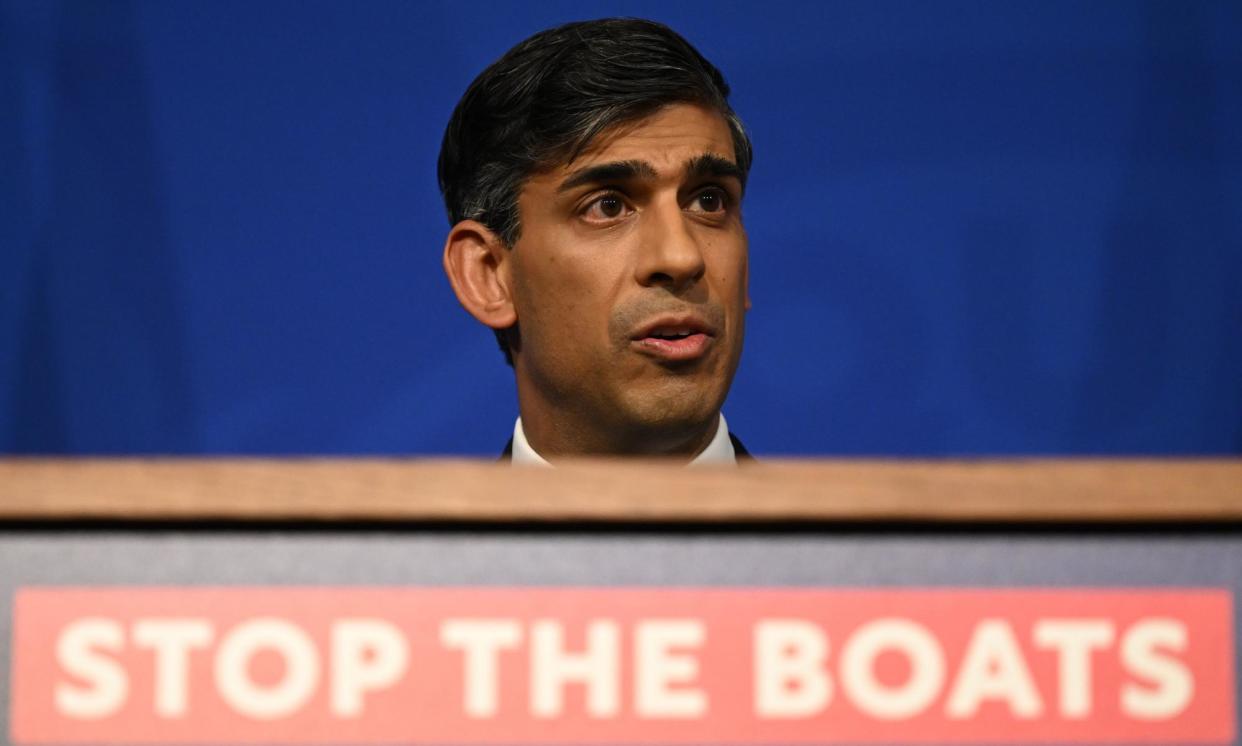Sunak’s Rwanda asylum plan: three options after supreme court rejection

After the UK’s highest court last month rejected the government’s plans to deport asylum seekers to Rwanda, Rishi Sunak is preparing a response aimed at overcoming the barriers to his key immigration policy.
The supreme court ruling undermines one of the prime minister’s key pledges to “stop the boats” making illegal crossings across the Channel. He has been facing increasing pressure from the right of the Conservative party who want him to in effect ditch the UK’s human rights framework.
All five judges agreed with the court of appeal that there was a real risk of asylum claims being wrongly determined in Rwanda, resulting in people being wrongly returned to their country of origin and facing persecution.
The ruling also recognised that evidence cast doubt on Rwanda’s ability to fix “deficiencies” in its asylum system and see through “the scale of the changes in procedure, understanding and culture which are required”.
The UK government’s response is centred on the promise of a new treaty with Rwanda, along with fresh legislation and a dossier of evidence to address concerns.
A treaty
A revised treaty with Rwanda would replace the memorandum of understanding (MoU) between the country and the UK, which embodies the deportation scheme.
British lawyers could also be sent to Rwandan courts as part of the new accord that would replace the MoU, which is not legally binding and cannot be relied on in any court. The UK home secretary, James Cleverly, is understood to be close to finalising a treaty and could even fly to Rwanda this week.
A former head government lawyer, Jonathan Jones, has written in a briefing by the Institute for Government that a new treaty would “presumably” make substantive changes, for example to provide additional safeguards for how the claims of UK asylum-seekers would be handled and how they would be treated if their claims failed.
The Home Office was looking “very carefully” at the idea of sending the lawyers, the cabinet minister Lucy Frazer said on Monday.
The challenges: The government in Kigali is unlikely to accept any arrangement which would look like colonial-style legal interference.
Rwanda is also reportedly pushing for more money on top of the £140m already committed to the scheme, although the Sunday Times reported that Kigali is to be given a £15m top-up payment to agree fresh terms on its deal.
Sunak met Rwanda’s president, Paul Kagame, on the sidelines of the Cop28 climate talks in Dubai but declined afterwards to say how much more money he would spend to get the scheme off the ground.
Difficulty rating: 7 (signing one is potentially doable, but its efficacy is open to question)
Legislation
Rwanda would be declared safe for asylum seekers under new “emergency” legislation being drawn up in an attempt to neutralise the problem of the courts, and which could come as soon as this week.
Downing Street has been considering two options. First, the so-called semi-skimmed option, would disapply only the UK’s Human Rights Act in asylum claims but would not be expected to prevent challenges by individual migrants.
A more hardline second, “full-fat”, option would remove the right of judicial review and include “notwithstanding clauses” that would allow ministers to ignore the European convention on human rights (ECHR) and other international treaties in the area of asylum.
The challenges: Civil service officials will have been outlining the stark consequences of stepping away from international commitments, which others have publicly warned could leave the UK in a similar category to pariah states such as Russia.
There are also internal warnings that ignoring international law could be a breach of the ministerial code, the Mail on Sunday reported.
Tory moderates arguing against opt-outs from international commitments and rightwingers urging the government to do this and more present a complicated political challenge. One of a group of rightwingers who came out of a meeting with Cleverly last week complained the home secretary had gone “full soya”.
Either house of parliament could block or delay the proposed legislation – in the same way they could block or delay any bill, while charities emphasise that legislation cannot take away the right of an individual to launch a legal challenge.
Difficulty rating: 9 (due to opposition in both houses of parliament)
A bundle of evidence
Following last month’s supreme court rejection of the Rwanda plan, government lawyers are reportedly preparing a dossier of evidence designed to show that the country is safe for asylum seekers.
The so-called bundle of legal evidence will address the points on which the supreme court’s ruling was based, the i reported.
Claimants who had challenged the Rwanda plan in court argued that ministers had ignored clear evidence that Rwanda’s asylum system was unfair and arbitrary.
However, while the detail of the government’s plans are still awaited, Sunak’s spokesperson insisted last month that “substantive amounts of work” had been done to address the supreme court’s concerns, “whether that’s improving the quality of asylum decision-making, ensuring us a stronger judicial oversight of the process”.
The challenges: The scale of the supreme court’s rejection of the government case was illustrated by the fact that all five judges unanimously agreed with the court of appeal that there had not been a proper assessment of whether Rwanda was safe.
Difficulty rating: 8 (the government can come up with any evidence it wants but the reality on the ground in Rwanda remains unchanged for now).

 Yahoo News
Yahoo News 
